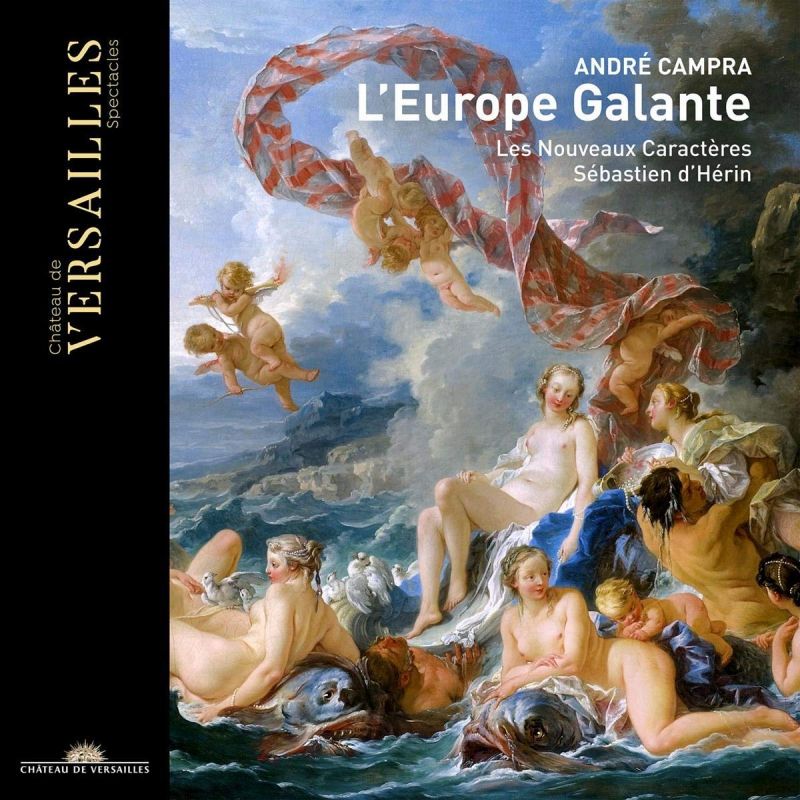CAMPRA L'Europe galante (d'Hérin)
View record and artist detailsRecord and Artist Details
Composer or Director: André Campra
Genre:
Opera
Label: Chateau
Magazine Review Date: 01/2019
Media Format: CD or Download
Media Runtime: 133
Mastering:
DDD
Catalogue Number: CVS002

Tracks:
| Composition | Artist Credit |
|---|---|
| (L')Europe galante |
André Campra, Composer
Anders J. Dahlin, Philène; Dom Pedro; Octavio, Tenor André Campra, Composer Caroline Mutel, Vénus; Une Espagnole; Olimpia; Roxane, Soprano Heather Newhouse, Une Grâce; Céphise; Une Espagnole; Une femme du Bal, Soprano Isabelle Druet, La Discorde; Doris; Une femme du Bal; Zaïde, Mezzo soprano Les Nouveaux Caractères Nicolas Courjal, Silvandre; Dom Carlos/; Zuliman, Bass Sébastien d'Hérin, Conductor |
Author: David Vickers
In the prologue, Discord bickers superciliously with the offended Venus’s insistence that love is to be found all over the nations of Europe. The first entrée (France) is a pastoral depiction of the transient amorous loyalties of fickle shepherds – Nicolas Courjal’s ardent Silvandre arranges a divertissement to entertain the immune Céphise, whose dulcet beauty is given instant credence by Heather Newhouse’s silken singing of her entrance air (bewailing that she is heartily fed up with all the attention she gets every few days from different men). It transpires that only two days earlier Silvandre had sworn undying love to Doris – who concludes the entrée with a heartbroken soliloquy sung touchingly by Isabelle Druet. The second entrée is a pair of quixotic Spaniards singing their night-time serenades under the balconies of their respective mistresses; Dom Pedro’s sensual sommeil is sung mellifluously by Anders Dahlin, accompanied by melancholic strings and soft flutes (this chaconne alone is worth the price of admission), whereas under a nearby balcony Dom Carlos (not that one) sings an impassioned love song of a broodier character. It is unsurprising that castanets make a noisy appearance in the Spanish dances – clearly the whole street is going to be awoken – but a little Spanish song sung ‘by a lady musician’ is delivered by Caroline Mutel with impeccable translucence.
The third entrée is a Venetian masked ball: Olimpia rebuffs the jealous Octavio, who pretends to murder his rival but is then despondent upon witnessing her grief. Assorted little airs with chorus refrains and chaconnes for the masqueraders feature excellent contributions from the woodwinds. The last entrée is set in a Turkish seraglio; the slave Zäide (not that one) and Roxane compete for the attention of the sultan Zuliman; after Roxane attempts to stab her rival, the sultan opts decisively for Zäide (whose opening soliloquy professing her unrequited love is sung eloquently by Druet). The celebration of the triumph of love culminates in a lively succession of songs, choruses and dances for the Ottoman imperial guards, including a janissary band of percussion that is performed spicily. Having been an obvious lacuna in the discography for so long, this is essential listening for all admirers of French Baroque opera.
Discover the world's largest classical music catalogue with Presto Music.

Gramophone Digital Club
- Digital Edition
- Digital Archive
- Reviews Database
- Full website access
From £8.75 / month
Subscribe
Gramophone Full Club
- Print Edition
- Digital Edition
- Digital Archive
- Reviews Database
- Full website access
From £11.00 / month
Subscribe
If you are a library, university or other organisation that would be interested in an institutional subscription to Gramophone please click here for further information.




